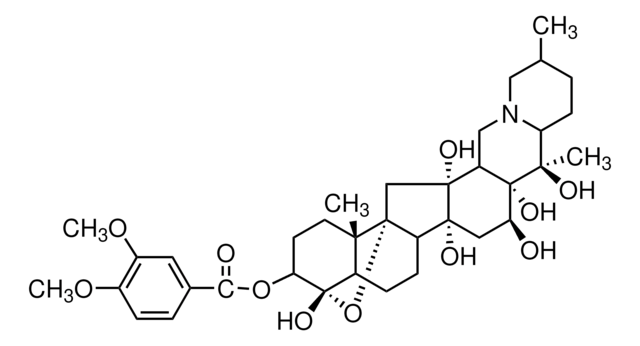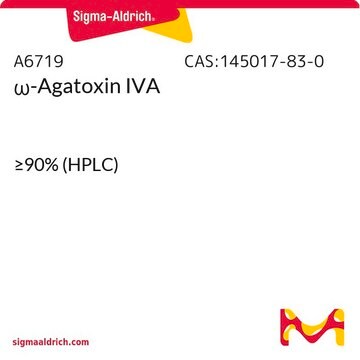推薦產品
品質等級
化驗
≥98% (HPLC)
形狀
powder
顏色
white to beige
溶解度
DMSO: 10 mg/mL (clear solution)
儲存溫度
2-8°C
SMILES 字串
CC(C)(C)CCN1C[C@H]2C(CNC(=O)c3cc(Cl)cc(Cl)c3)[C@H]2C1
InChI
1S/C19H26Cl2N2O/c1-19(2,3)4-5-23-10-16-15(17(16)11-23)9-22-18(24)12-6-13(20)8-14(21)7-12/h6-8,15-17H,4-5,9-11H2,1-3H3,(H,22,24)/t15-,16-,17+
InChI 密鑰
GSJIGYLGKSBYBC-OSYLJGHBSA-N
應用
ML218 has been used as a:
- T-type channel blocker to test its effect on the nociceptive behavior associated with homocysteinemia rats
- T-type voltage-sensitive calcium channel (VSCC) inhibitor in osteoblasts
- T-type calcium channel blocker to test its effect on the viability of neural progenitor cells
生化/生理作用
ML218 (CID 45115620) is a potent and selective T-Type (Cav3.1, Cav3.2, Cav3.3) calcium channel inhibitor (Cav3.2, IC50 = 150 nM in Ca2+ flux; Cav3.2 IC50 = 310 nM and Cav3.3 IC50 = 270 nM with good Drug metabolism/Pharmacokinetics. In a panel of 68 GPCRs, ion channels and transporters, ML218 was found to bind significantly only two other targets (sodium channel site 2 and sigma 1) and had no significant inhibition of L- or N-type calcium channels, KATP or hERG potassium channels. It showed robust inhibition of calcium current in STN neurons and was orally active in a rodent model of Parkinson′s Disease.
特點和優勢
This compound is featured on the Calcium Channels page of the Handbook of Receptor Classification and Signal Transduction. To browse other handbook pages, click here.
儲存類別代碼
11 - Combustible Solids
水污染物質分類(WGK)
WGK 3
閃點(°F)
Not applicable
閃點(°C)
Not applicable
分析證明 (COA)
輸入產品批次/批號來搜索 分析證明 (COA)。在產品’s標籤上找到批次和批號,寫有 ‘Lot’或‘Batch’.。
Brittany D Spitznagel et al.
ACS chemical neuroscience, 11(21), 3658-3671 (2020-11-05)
Malignant migrating partial seizures of infancy is a rare, devastating form of epilepsy most commonly associated with gain-of-function mutations in the potassium channel, Slack. Not only is this condition almost completely pharmacoresistant, there are not even selective drug-like tools available
Andreas Feigenspan et al.
Experimental eye research, 195, 108028-108028 (2020-04-12)
Expression patterns of voltage-gated ion channels determine the spatio-temporal dynamics of ion currents that supply excitable neurons in developing tissue with proper electrophysiological properties. The purpose of the study was to identify fast cationic inward currents in mouse retinal horizontal
Retsu Mitsui et al.
Pflugers Archiv : European journal of physiology, 468(2), 279-291 (2015-11-05)
Postcapillary venules (PCVs) play a critical role in regulating capillary hydrostatic pressure, but their contractile mechanisms are not well understood. We examined the properties of spontaneous vasomotion and corresponding Ca(2+) transients in gastric PCV. In the rat gastric submucosa, changes
Ji-Woon Kim et al.
Biomolecules & therapeutics, 26(5), 439-445 (2018-02-22)
T-type calcium channels are low voltage-activated calcium channels that evoke small and transient calcium currents. Recently, T-type calcium channels have been implicated in neurodevelopmental disorders such as autism spectrum disorder and neural tube defects. However, their function during embryonic development
Kaori Sato-Numata et al.
The journal of physiological sciences : JPS, 70(1), 49-49 (2020-10-17)
Arginine vasopressin (AVP) neurons play essential roles in sensing the change in systemic osmolarity and regulating AVP release from their neuronal terminals to maintain the plasma osmolarity. AVP exocytosis depends on the Ca2+ entry via voltage-gated Ca2+ channels (VGCCs) in
文章
我們提供許多與鈣通道相關的產品,以滿足您的研究需求。
We offers many products related to calcium channels for your research needs.
我們的科學家團隊在所有研究領域都有豐富的經驗,包括生命科學、材料科學、化學合成、色譜、分析等.
聯絡技術服務








